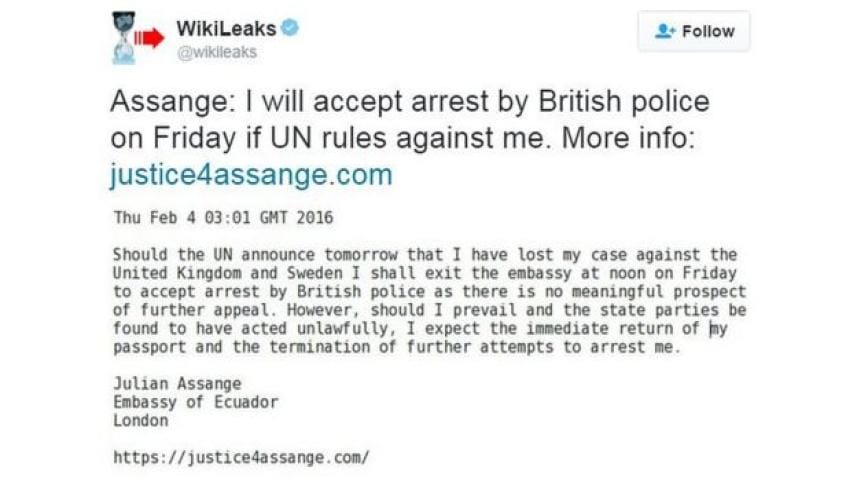Julian Assange 'arbitrarily held'

A UN panel has ruled in favour of Wikileaks founder Julian Assange after he complained he was "arbitrarily detained", the BBC understands.
Assange claimed asylum in London's Ecuadorean embassy in 2012 to avoid extradition to Sweden over sex assault claims, which he denies.
The Met Police says Assange would be arrested if he does leave the embassy.
He earlier said his passport should be returned and his arrest warrant dropped if the UN panel ruled in his favour.

In 2014, Assange complained to the UN that he was being "arbitrarily detained" as he could not leave the embassy without being arrested.
The application claimed Assange had been "deprived of his liberty in an arbitrary manner for an unacceptable length of time".
The UN's Working Group on Arbitrary Detention is due to announce the findings of its investigation on Friday.
While the BBC understands the panel will find in Assange's favour, Wikileaks tweeted it was waiting for "official confirmation".
Downing Street said the panel's ruling would not be legally binding in the UK.
A government spokesman said Assange still faced one allegation of rape, while a European Arrest Warrant remained in place.
"We have been consistently clear that Assange has never been arbitrarily detained by the UK but is, in fact, voluntarily avoiding lawful arrest by choosing to remain in the Ecuadorean embassy," he added.
"The UK continues to have a legal obligation to extradite Assange to Sweden."
Australian Assange was originally arrested in London in 2010 under a European Arrest Warrant issued by Sweden.
He claimed asylum inside the Ecuadorean embassy in Knightsbridge after the UK Supreme Court ruled the extradition against him could go ahead.
Swedish prosecutors dropped two sex assault claims against Assange last year. However, he still faces the more serious accusation of rape.
His Wikileaks organisation posted secret American government documents on the internet, and Assange says he believes Washington will seek his transfer to the US if he is sent to Sweden.
In the statement, published earlier by Wikileaks on Twitter, Assange said: "Should the UN announce tomorrow that I have lost my case against the United Kingdom and Sweden I shall exit the embassy at noon on Friday to accept arrest by British police as there is no meaningful prospect of further appeal.
"However, should I prevail and the state parties be found to have acted unlawfully, I expect the immediate return of my passport and the termination of further attempts to arrest me."
Last October, Scotland Yard said it would no longer station officers outside the Ecuador embassy following an operation which it said had cost £12.6m. But it said "a number of overt and covert tactics to arrest him" would still be deployed.
Julian Assange: Key dates
- August 2010 - Swedish prosecutors issue an arrest warrant for Assange
- May 2012 - UK Supreme Court rules he should be extradited to Sweden to face questioning
- June 2012 - Assange claims asylum in the Ecuadorean embassy in London
- September 2014 - Assange submits complaint against Sweden and the UK to the UN Working Group on Arbitrary Detention
- August 2015 - Swedish prosecutors drop their investigation into two allegations - one of sexual molestation and one of unlawful coercion - but say he still faces the more serious accusation of rape.
- October 2015 - Met Police announce officers will no longer be stationed outside the Ecuadorean embassy



 For all latest news, follow The Daily Star's Google News channel.
For all latest news, follow The Daily Star's Google News channel.
Comments